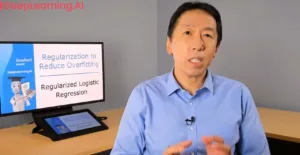Introduction
The Machine Learning Specialization Certificate by Andrew Ng is one of the most prominent Machine Learning specialization certificates. The earlier version of the certificate was in 2012 using Octave and Matlab as its programming language. This blog post will review the updated version taught in Python. Specifically, it will explore the following areas;
- What is it?
- The Specialization Program/Curriculum
- Who Can take the specialization?
- How long it takes to complete it
- The Certificate itself
- How much does the certificate cost?
- Can you get the certificate for free?
- Skills you will gain
- Career Opportunities
- Pros and Cons
- Is It Worth It?
- Some Frequently Asked Questions
The course was created by a collaboration between Stanford University and DeepLearning AI creates the certificate. The Principal tutor is Andrew Ng. It is popular for ML Specialization because of the value it provides and because of its tutor (creator) – Andrew Ng. So, we start with the course creator – Who is he?
Who Is Andrew Ng?

Andrew is a world-renowned Machine Learning scientist and entrepreneur – an adjunct professor at Stanford. When it comes to Machine Learning and Machine Learning, his input cannot be overstated. Many ML Engineers have at some point consumed his materials on the subjects. His other credentials include;
- Co-founder of Google Brains and Former VP and Chief Scientist at Baidu
- Co-Founder of Coursera
- Founder of DeepLearning.AI
He is the author of several books and online courses on AI and ML.
What is machine learning specialization?
It is a beginner-friendly online training program that teaches the fundamentals of Machine Learning and how to use the knowledge to build real-world AI applications. Standford Online and DeepLearning AI Online created the program to teach ML skills. It is delivered through Coursera.
Machine learning Andrew Ng Coursera – The Courses
The Andrew Ng ML Specialization Program consists of three courses, each extensively dealing with an aspect of Machine Learning Specialization. All 3 courses have an impressive rating of 4.9 and great reviews.

The Andrew Ng ML Specialization Program consists of three courses, each extensively dealing with an aspect of Machine Learning Specialization. All 3 courses have an impressive rating of 4.9 and great reviews.
The description of each course is as follows;
- Course 1: Supervised Machine Learning: Regression and Classification – An Introduction to Machine Learning, Regression with multiple input variables, Classification. Course duration is 33 hours
- Course 2: Advanced Learning Algorithms – Consists of 4 modules; Neural Networks, Neural network training, Advice for applying Machine Learning, and Decision trees. Course duration is 34 hours
- Course 3: Unsupervised Learning, Recommenders, Reinforcement Learning – This consists of 3 modules; Unsupervised learning, Recommender systems, and Reinforcement learning. Duration is 27 hours.
Who Can take the specialization?
The Certificate program is for beginners who want to build a career in AI or Machine Learning, however, there is a requirement for basic Python coding skills (intermediate level) and high school maths (algebra, calculus, statistics arithmetic).
It is also for people who have had some skills in ML and want to upgrade those skills. The program does not assume knowledge of maths, so it incorporates some additional maths lessons into the course.
How long is Machine learning certification course?

It takes about 2 months to complete the certificate program (on a 10-hour/week schedule). Since the program is self-paced, you can complete it much faster. The total program content (for the three-course series) is 94 hours.
The Machine Learning Specialization Certificate
There is a Certificate of Completion that is issued to you upon completing the certification program. This can be shared on your LinkedIn profile. Sharing it on your LinkedIn makes you visible to prospective employers. becoming important.
How much does the Machine learning specialization cost?
The Cost depends on how long it takes you to complete the course. You pay through a Coursera monthly subscription of $39 (or $49 in the US/Canada, £47 per month in the UK). Completing the program on a 2-month schedule will cost $78 ($98 in the US). There is a free 7-day trial period to assess the program.
Machine learning Specialization Coursera free
There is the option to access the specialization certificate courses for free. You can do this by using the Course Audit option. You will however not be eligible for a Certificate if you use the free course audit option. See how to audit Coursera courses here.

You can also apply for Financial aid for those who cannot afford the program. You will need to apply for this on the certificate program page. If approved, you can take the program for free and earn the certificate.
Skills you will Gain
The certificate program will teach you to build models using NumPy and Scikit-learn. how you will build and train supervised models for prediction and binary classification tasks. How to apply best practices for ML development and using Unsupervised Learning techniques etc. Specifics are;
- Artificial Neural Networks
- Logistic Regression
- Linear Regression
- Recommender Systems
- Decision trees
The Pros and Cons of the Machine Learning Specialization Certificate
The Pros
- The certificate program is very cheap relative to a boot camp or a college degree($80k -100k). Although it is not a substitute for a college degree, you will be paying very little for in-demand skills by comparison.
- It teaches actual practical skills that you can use to advance a career in Artificial Intelligence and Machine Learning roles.
- The Certification is gaining increasing recognition among employers looking for real-world ML skills.
- The certificate is sharable on LinkedIn, which increases your chances of being contacted by employers scouting for candidates with Machine Learning skills
- The online reviews and ratings of the certification courses are outstanding
The Cons
- Although it claims to be a beginner-level course, it does require significant Python skills and a good grasp of maths (Matrices, statistics, multivariable calculus, etc)
- It may not be sufficient to take some job roles. You may need to take other courses (like the advanced Deep Learning Specialization) or further studies in a degree program.
- Certificate of completion rather than an actual certificate from writing a professional exam.
Career Opportunities and Salaries

The demand is high for Machine Learning professionals and there are different career paths for someone with ML skills, some of these include;
- Machine Learning Engineers
- Data Scientists
- NLP
- Human-Centered Machine Learning Designer
- Business Intelligence Developer.
The best approach to getting any of these job roles is to narrow your options to a specific specialization and develop your skills, portfolio, and resume to match such.
The salaries for Machine Learning Job roles are among the highest in the Data-driven careers.
For example, a Machine Learning Engineer earns on average about $130k per year, a Data scientist about $125K, an AI Engineer $127k, a Business Intelligence Developer $108k, and a Human-Centered Machine Learning Engineer $117k per year.
Is the Machine Learning Specialization Worth It?
Yes, it is. you get to gain Machine Learning skills at minimal cost ( or even free) and the potential for starting or advancing a career in any of the very lucrative in-demand ML jobs. The certificate is of value to employers and also helps you gain the foundational skills for more advanced ML jobs.
Getting a job with the certification will demand a satisfactory background, knowledge depth, an impressive portfolio, a resume, and a personal drive to achieve your career goals.
Check out a similar review of the IBM MACHINE LEARNING PROFESSIONAL CERTIFICATE
Frequently Asked Questions

The Following are some Frequently Asked Machine Learning Questions
Is machine learning still in demand?
Yes. Machine Learning was the 5th most in-demand job in 2023 and the momentum has remained high. Businesses are looking for professionals with ML skills to fulfill various job roles across different industries.
Also, according to the World Economic Forum report, the AI and ML field will grow by 40 percent or about 1 million new jobs by 2028. This represents the largest job growth of any occupation.
Does machine learning require coding?
Yes. To be an effective Machine learning professional, you must know how to code. You must learn at least a Programming language. The most commonly used Programming language for Machine Learning is Python (and its various libraries). Others are R, Java, C++, JAVA, Matlab, etc.
Can I get a job in machine learning without a degree?
Absolutely. While the value of a degree cannot be overlooked, what employers are really looking for is Machine Learning skills- practical ML skills. You can get a job in ML without a degree if you have those skills, demonstrate them with an impressive portfolio of ML projects, and reach out to prospective employers.
Oftentimes, Degrees and Certificates are just to get you noticed by prospective Employers, the actual employment is largely based on the Skills you have – both technical and non-technical. Many ML Professionals do not necessarily have a relevant degree. A good ML certification in many cases will suffice.
A Degree requirement is however a must in some big corporations with strict HR policies, but then again – there are exceptions to every rule.
What is the difference between a machine learning engineer and a data scientist?
A Machine Learning Engineer is a more specialized job role than that of a Data Scientist. While a Data Scientist will focus on drawing insights from Analyzing data, a Machine Learning Engineer will focus on writing codes, and building and deploying Machine Learning products. Machine Learning uses various tools and Algorithms to predict future events.
Both Machine Learning Engineers and Data Scientists rely heavily on data and their roles sometimes overlap.
Can a data scientist become a machine learning engineer?
Yes. The Learning curve from being a Data Scientist to a Machine Learning Engineer is really not that much. Data Science lays a very solid foundation for Machine Learning Engineering. And indeed, Many Data Scientists also incorporate Machine Learning skills into their work. You will need to learn about different ML frameworks and skills.
Bridging the Skill gap between Data Science and Machine Learning Engineering will depend on the role you want as a Machine Learning Engineer. Google for example MLE is almost exclusively Tensorflow style deep neural networks and/or reinforcement learning.
How hard is machine learning?
How hard Machine Learning is depends largely on your background. It is a specialized role, so you should expect to see some “beyond-average” knowledge and skill demand. You will need to have some understanding of Maths, good with programming languages like Python, and have some fundamentals in handling data.




